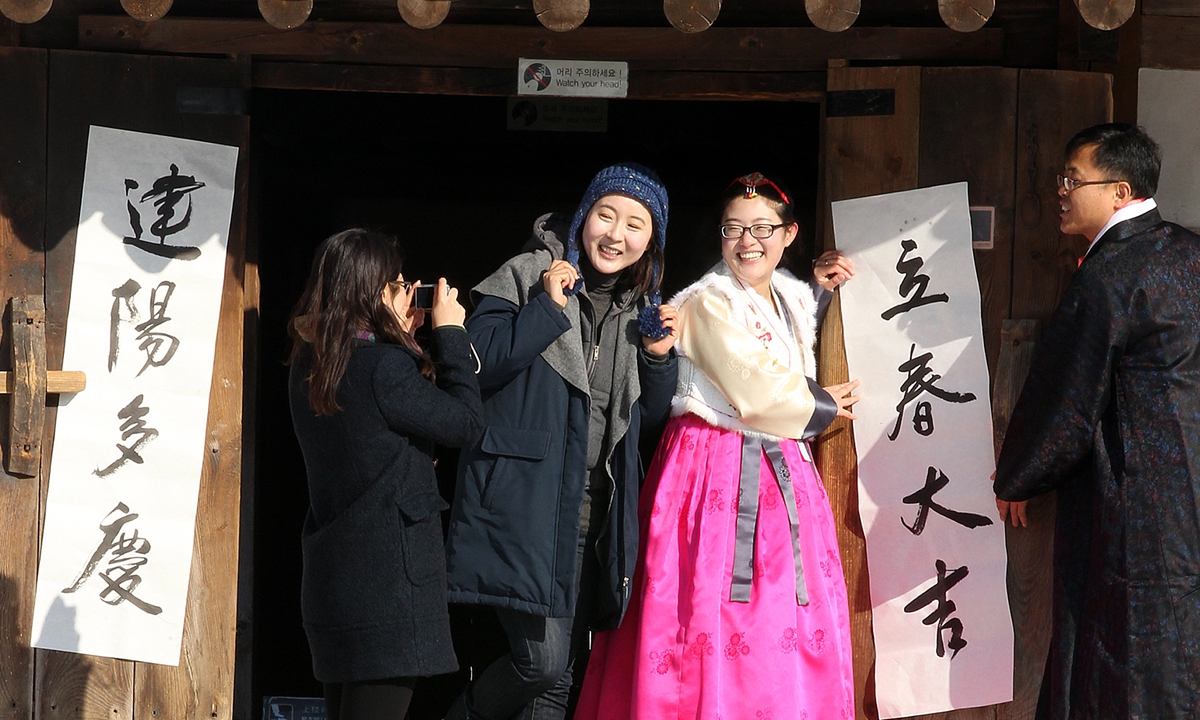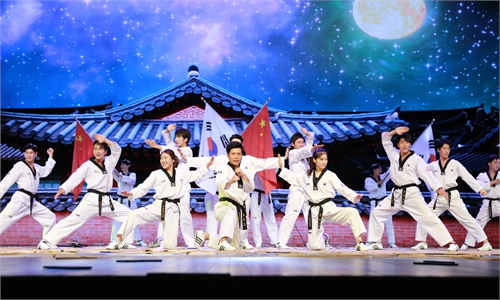IN-DEPTH / IN-DEPTH
'Reply 1992': active, sincere communications see fruits along three decades

Employees clad in Korean traditional dress attach a sheet of paper with springtime blessings in Chinese characters to a gate at the National Folklore Museum in Seoul. Photo: VCG
Whether it be Hong Kong films that have influenced a generation of people in South Korea, or Korean dramas and K-pop culture that have become part of many Chinese young people's lives, since the establishment of diplomatic ties between China and South Korea in August 1992, the advancements made in cultural exchanges have become a linchpin in sustaining mutual ties.
Sara Liu, a young engineer based in Shanghai, said her life was changed after watching the 2015 Korean drama Reply 1988. "I like it because it is very sincere. The family, friendship, and love dynamics depicted in the show transcend time and language," she told the Global Times.
"Because of this TV series, I pay more attention to the people around me and cherish the time I can spend with them. I have also met a lot of friends who also liked the show, which is a very precious commonality in our friendship," she said.
Reply 1988 is an example of how South Korean cultural products have influenced Chinese young people in recent years. In Douban, China's IMDb-like database, Reply 1988 has a 9.7 score out of a possible 10 as ranked by more than 800,000 users and is widely discussed among Chinese audiences.
Born in 1992, Liu said she hopes China and South Korea would further promote deeper exchanges in cultures, with an emphasis on China's excellent culture being presented to young Koreans.
Liu's kindred spirit in South Korea, Semi Lim, is a representative of the young generation in South Korea that is fond of Chinese popular culture.
She was first exposed to Chinese culture through TV dramas and continued consuming even more Chinese TV shows and films. In order to understand the words spoken by her idol Wang Junkai, Lim is learning Chinese, which has further deepened her affections for Chinese culture.
"Culture and media are very powerful. Through cultural exchanges, diplomatic ties could be improved. I hope that more Chinese TV shows and films will be aired in South Korea, adding more opportunities for people from both countries to understand each other," she told the Global Times.
As early as in March 1994, during then South Korean president Kim Young-sam's visit to China, the two countries signed an agreement to promote and expand intergovernmental cultural cooperation.
To mark the first decade of the development of diplomatic ties, 2002 became the China-South Korea Year of People-to-People Exchanges, preceded by a series of commemorative activities.
This year, the two countries launched the South Korea-China Year of Cultural Exchanges for the 30th anniversary of the establishment of diplomatic relations.
"China attaches great importance to people-to-people and cultural exchanges, and cooperation between China and South Korea, and our support for cooperation in the cultural industry between the two sides is positive and sincere," Xing Haiming, Chinese Ambassador to South Korea, said during an interview with South Korea's Channel A on August 17.
Since2021, there have been outstanding Korean literary and artistic works, including 10 Korean films, 10 Korean TV dramas, and four Korean games that have been made available to the Chinese public, according to him.
Global Times

